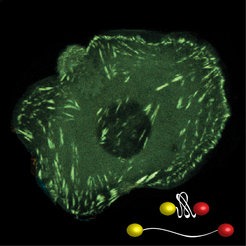Molecular Force Sensors

Proteins are often considered as molecular machines. To understand how they work, it is not enough to visualize the involved proteins under the microscope. Wherever machines are at work mechanical forces occur, which in turn influence biological processes. These extremely small intracellular forces can be measured with the help of molecular force sensors. Now researchers at the Max Planck Institute of Biochemistry in Martinsried have developed molecular probes that can measure forces across multiple proteins with high resolution in cells. The results of their work were published in the journal Nature Methods.
When proteins pull on each other, forces in the piconewton range are generated. Cells can detect such mechanical information and modulate their response depending on the nature of the signal. Adhesion proteins on the surface of cells, for instance, recognize how rigid their environment is to adjust the protein composition of the cell accordingly. To measure such tiny forces, the group of Molecular Mechanotransduction at the Max Planck Institute is developing molecular force sensors. “These small measuring instruments work along the lines of a spring scale,” says Carsten Grashoff, head of the research group.
The innovative probes consist of two fluorescent molecules that are connected by a sort of molecular spring. When a force of just a few piconewton acts on the molecule, the spring stretches, and this change can be detected using a special microscopic method. “We’re now able to measure the mechanics of several molecules simultaneously,” Carsten Grashoff explains. In contrast to previous experiments, the scientists are not only able to determine which proteins, but also how many of them are under force at any given moment.
